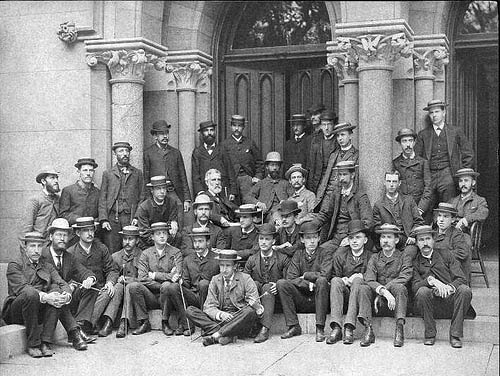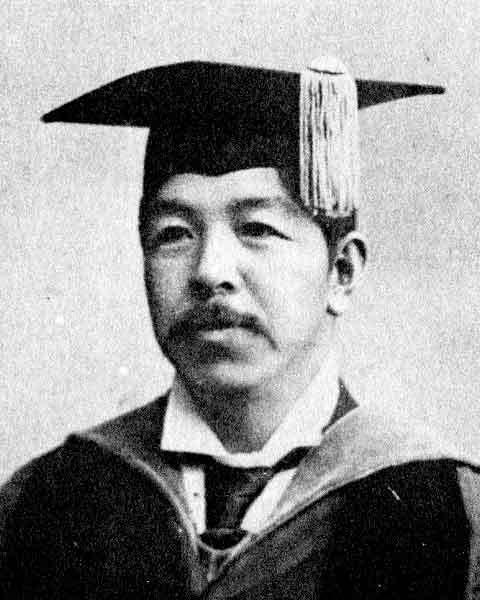|
Ichirō Hatoyama
was a Japanese politician who was Prime Minister of Japan from 1954 to 1956. A conservative, Hatoyama helped oversee the 1955 merger of the Liberal Party and the Democratic Party to create the Liberal Democratic Party (Japan), of which Hatoyama was the first party president and first prime minister, and which would go on to rule Japan for most of the next seven decades. As prime minister, Hatoyama's signature achievement was restoring official diplomatic relations with the Soviet Union, which had been in abeyance since World War II. Personal life Ichirō Hatoyama was, as his name indicates, the first born boy. He was born into a wealthy cosmopolitan family in Tokyo. His father Kazuo Hatoyama (1856–1911) was a Yale graduate (and Speaker of the House of Representatives) and his mother Haruko Hatoyama (1863–1938) was a famous author and the founder of Kyoritsu Women's University. His brother Hideo Hatoyama was a noted jurist. Ichirō was a Master Mason and a Protestant Ch ... [...More Info...] [...Related Items...] OR: [Wikipedia] [Google] [Baidu] |
Prime Minister Of Japan
The prime minister of Japan ( Japanese: 内閣総理大臣, Hepburn: ''Naikaku Sōri-Daijin'') is the head of government of Japan. The prime minister chairs the Cabinet of Japan and has the ability to select and dismiss its Ministers of State. The prime minister also serves as the civilian commander-in-chief of the Japan Self Defence Forces and as a sitting member of the House of Representatives. The individual is appointed by the emperor of Japan after being nominated by the National Diet The is the national legislature of Japan. It is composed of a lower house, called the House of Representatives (Japan), House of Representatives (, ''Shūgiin''), and an upper house, the House of Councillors (Japan), House of Councillors (, ... and must retain the nomination of the lower house and answer to parliament to remain in office. The position and nature of this title allow the holder to reside in and work at the Prime Minister's Official Residence (Japan), Prime Minist ... [...More Info...] [...Related Items...] OR: [Wikipedia] [Google] [Baidu] |
Christianity In Japan
Christianity in Japan is among the nation's minority religions in terms of individuals who state an explicit affiliation or faith. Between less than 1 percent and 1.5% of the population claims Christian belief or affiliation. Although formally banned in 1612 and today critically portrayed as a foreign "religion of colonialism", Christianity has played a role in the shaping of the relationship between religion and the Japanese state for more than four centuries. Most large Christian denominations, including Roman Catholicism, Protestantism, Oriental Orthodoxy, and Orthodox Christianity, are represented in Japan today. Christian culture has a generally positive image in Japan. The majority of Japanese people are, traditionally, of the Shinto or Buddhist faith. The majority of Japanese couples, typically 60–70%, are wed in 'nonreligious' Christian ceremonies. This makes Christian weddings the most influential aspect of Christianity in contemporary Japan. Etymology The Japanese ... [...More Info...] [...Related Items...] OR: [Wikipedia] [Google] [Baidu] |
Baptist
Baptists form a major branch of Protestantism distinguished by baptizing professing Christianity, Christian believers only (believer's baptism), and doing so by complete Immersion baptism, immersion. Baptist churches also generally subscribe to the doctrines of soul competency (the responsibility and accountability of every person before God in Christianity, God), ''sola fide'' (salvation by just faith alone), ''sola scriptura'' (scripture alone as the rule of faith and practice) and Congregationalist polity, congregationalist church government. Baptists generally recognize two Ordinance (Christianity), ordinances: baptism and Eucharist, communion. Diverse from their beginning, those identifying as Baptists today differ widely from one another in what they believe, how they worship, their attitudes toward other Christians, and their understanding of what is important in Christian discipleship. For example, Baptist theology may include Arminianism, Arminian or Calvinism, Calvi ... [...More Info...] [...Related Items...] OR: [Wikipedia] [Google] [Baidu] |
Protestantism
Protestantism is a Christian denomination, branch of Christianity that follows the theological tenets of the Reformation, Protestant Reformation, a movement that began seeking to reform the Catholic Church from within in the 16th century against what its followers perceived to be growing Criticism of the Catholic Church, errors, abuses, and discrepancies within it. Protestantism emphasizes the Christian believer's justification by God in faith alone (') rather than by a combination of faith with good works as in Catholicism; the teaching that Salvation in Christianity, salvation comes by Grace in Christianity, divine grace or "unmerited favor" only ('); the Universal priesthood, priesthood of all faithful believers in the Church; and the ''sola scriptura'' ("scripture alone") that posits the Bible as the sole infallible source of authority for Christian faith and practice. Most Protestants, with the exception of Anglo-Papalism, reject the Catholic doctrine of papal supremacy, ... [...More Info...] [...Related Items...] OR: [Wikipedia] [Google] [Baidu] |
Master Mason
Freemasonry or Masonry refers to fraternal organisations that trace their origins to the local guilds of stonemasons that, from the end of the 13th century, regulated the qualifications of stonemasons and their interaction with authorities and clients. Modern Freemasonry broadly consists of two main recognition groups: * Regular Freemasonry insists that a volume of scripture be open in a working lodge, that every member profess belief in a Supreme Being, that no women be admitted, and that the discussion of religion and politics be banned. * Continental Freemasonry consists of the jurisdictions that have removed some, or all, of these restrictions. The basic, local organisational unit of Freemasonry is the Lodge. These private Lodges are usually supervised at the regional level (usually coterminous with a state, province, or national border) by a Grand Lodge or Grand Orient. There is no international, worldwide Grand Lodge that supervises all of Freemasonry; each Grand L ... [...More Info...] [...Related Items...] OR: [Wikipedia] [Google] [Baidu] |
Hideo Hatoyama
Hideo Hatoyama (2 February 1884 – 29 January 1946) was a Japanese jurist whose writings about civil law were influential in pre-World War II Japan. Hatoyama was part of the prominent Hatoyama family. His father Kazuo Hatoyama was speaker of the House of Representatives of Japan during the Meiji era, and his brother Ichirō Hatoyama was an influential politician and minister in the 1930s and 40s. Through him, Hideo Hatoyama was able to exert great influence on Japanese jurisprudence. After graduating from Tokyo Imperial University in 1908 and subsequent graduate studies in France and Germany, he taught law at his alma mater from 1916 to 1926, after which he worked as a lawyer and left his professorship to his student Sakae Wagatsuma. Hatoyama wrote influential treatises and textbooks on legal transactions (1910) and the law of obligations (1916), but his ideas fell out of fashion after Izotaro Suehiro's attacks on German-style jurisprudence of concepts. Fluent in English, Ha ... [...More Info...] [...Related Items...] OR: [Wikipedia] [Google] [Baidu] |
Kyoritsu Women's University
is a private women's college in Chiyoda, Tokyo, Japan, established in 1949. History The vocational predecessor of the school was founded in 1886. The name "Kyoritsu", meaning "standing together" in Japanese, came from the fact that 34 people were involved in the foundation of the school; among them were educator Haruko Hatoyama, Kyuichiro Nagai (the father of writer Kafu Nagai), and educator Seiichi Tejima. Mission The founding of Kyoritsu marked the very beginning of women's higher education in Japan: To recognize the need to "educate modern women in knowledge and skills, and to elevate the position of women in society." Facilities Kyoritsu Kodo is the school's 2,010-capacity auditorium. The auditorium has been used for concerts, hosting bands such as Free, James Gang and Yes. Exchanges The university has established exchanges and links with other international institutions of higher education—for example, the University of PennsylvaniaDe Mejía, Anne-Marie. (2002 ... [...More Info...] [...Related Items...] OR: [Wikipedia] [Google] [Baidu] |
Haruko Hatoyama
was a Japanese educator of the Meiji, Taishō and Shōwa periods, and the matriarchal head of the prominent Japanese Hatoyama political family which has been called "Japan's Kennedy family." She was a co-founder of what is today Kyoritsu Women's University. Her husband was politician Kazuo Hatoyama. Early life Haruko Hatoyama was born in Matsumoto, the youngest of seven children (five girls and two boys). Her father, Tsumu, was a samurai. He changed the family name from Watanabe to Taga after the Meiji Restoration in 1868. Her education began at home with her mother, and was supplemented by the lessons from local teachers of Chinese classics. Her education was different from her sisters because she was allowed to pursue the same curriculum as a boy. She was among the first students to enroll when a small, all-girls school opened in Matsumoto in 1873. However, her knowledge was so advanced that her father decided to pull her out of the small school and take her to Tokyo to be e ... [...More Info...] [...Related Items...] OR: [Wikipedia] [Google] [Baidu] |
Yale Law School
Yale Law School (Yale Law or YLS) is the law school of Yale University, a private research university in New Haven, Connecticut. It was established in 1824 and has been ranked as the best law school in the United States by '' U.S. News & World Report'' every year between 1990 and 2022, when Yale made a decision to voluntarily pull out of the rankings, citing issues with the rankings' methodology. One of the most selective academic institutions in the world, the 2020–21 acceptance rate was 4%, the lowest of any law school in the United States. Its yield rate of 87% is also consistently the highest of any law school in the United States. Yale Law alumni include many prominent figures in law and politics, including United States presidents Gerald Ford and Bill Clinton and former U.S. secretary of state and presidential nominee, Hillary Clinton. Alumni also include current United States Supreme Court associate justices Clarence Thomas, Samuel Alito, Sonia Sotomayor and ... [...More Info...] [...Related Items...] OR: [Wikipedia] [Google] [Baidu] |
Kazuo Hatoyama
was the patriarchal head of the prominent Japanese Hatoyama political family which has been called "Japan's Kennedy family." Early life and education Hatoyama was born to a samurai family of the Katsuyama clan in present-day Minato, Tokyo. He graduated from the Tokyo Kaisei School in 1875. He was selected for a government-sponsored study abroad program and attended Columbia University (B.L., 1877) and Yale University Law School (M.L., 1878; D.C.L., 1880). Career When he returned to Tokyo in 1880, Hatoyama opened a law practice, while simultaneously lecturing at the University of Tokyo. He thereafter joined the ''Rikken Kaishintō'' political party founded by Ōkuma Shigenobu and became active in politics. In 1890, at Okuma's urging, he was appointed president of the Tokyo Semmon Gakko, which shortly thereafter became Waseda University. He headed this institution until 1907, although his title was largely honorary in nature. In 1901, he was invited to Yale for its 200th anniv ... [...More Info...] [...Related Items...] OR: [Wikipedia] [Google] [Baidu] |
Ichirō
, also written Ichiro, Ichirou or Ichiroh is a masculine Japanese given name. The name is occasionally given to the first-born son in a family. Like many Japanese names, Ichirō can be written using different kanji characters and can mean: * 一郎: "first son" * 一朗: "first clear, bright" People with the name *, Japanese judoka *, Japanese general * Ichiro Fujiyama (藤山 一郎, 1911–1993), a Japanese singer *, Japanese discus thrower * Ichirō Hatoyama (鳩山 一郎, 1883–1959), a Japanese politician and the 52nd, 53rd, and 54th Prime Minister of Japan *, Japanese shogi player *, Japanese footballer * Ichiro Ito (伊藤 一朗, born 1967), a Japanese rock guitarist *, Japanese diplomat, civil servant and politician * Ichiro Miyake (三宅 市郎, 1881–1964), a Japanese mycologist * Ichiro "Aniki" Mizuki (水木 一郎, 1948–2022), a Japanese vocalist * Ichiro Murakoshi (村越 伊知郎, born 1930), a Japanese voice actor * Ichirō Nagai (永井 一郎, born 1 ... [...More Info...] [...Related Items...] OR: [Wikipedia] [Google] [Baidu] |








